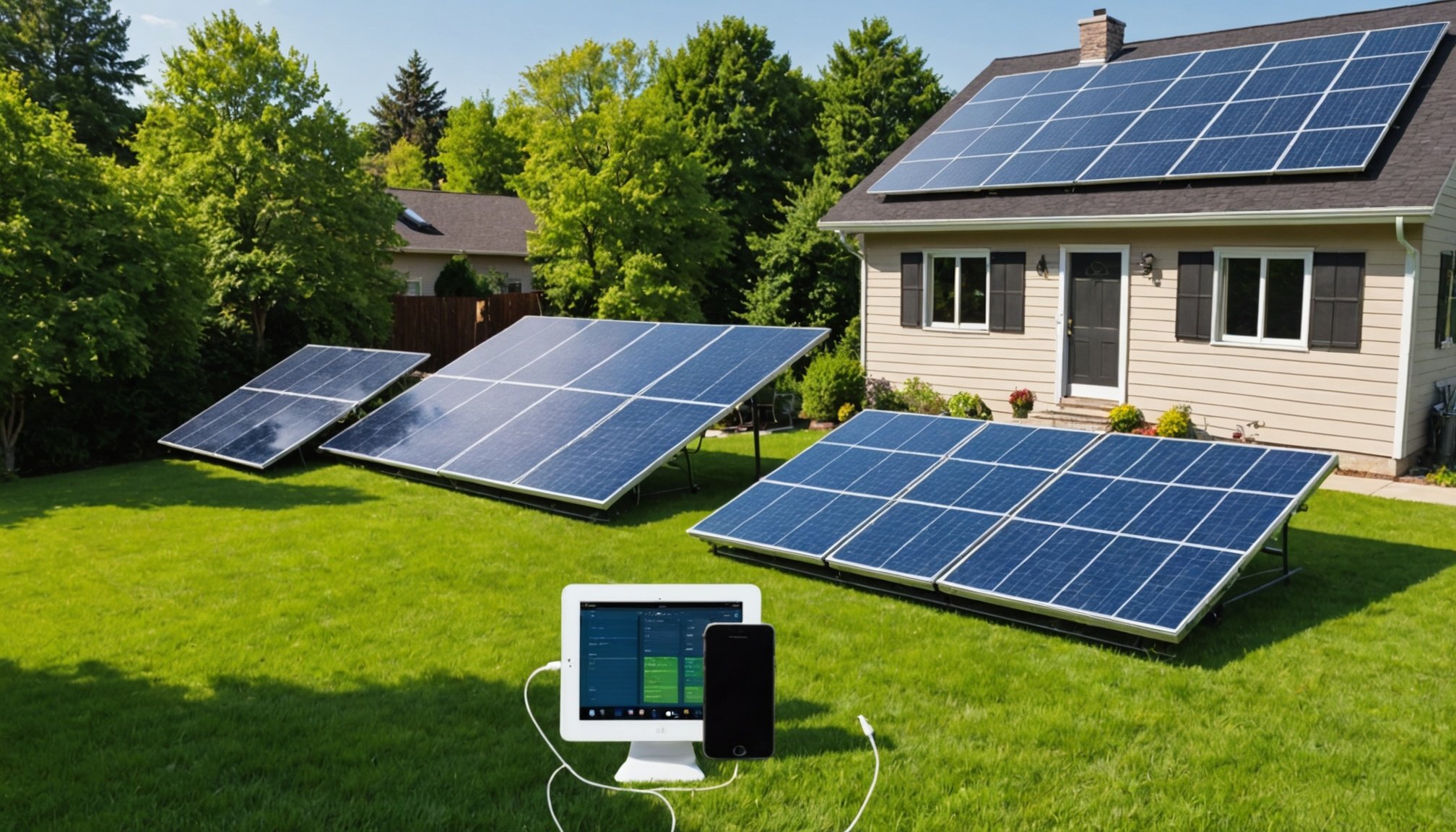Understanding Solar Panel Monitoring
Solar panel monitoring is crucial for optimizing the efficiency and performance of solar energy systems. As solar energy forms a part of smart home technology, effective solar energy tracking can significantly enhance your home’s energy management. With these systems, homeowners can track the production and consumption of solar energy, ensuring their systems operate at peak performance and maximizing potential savings.
Smart technology plays a pivotal role in enhancing solar energy monitoring. It allows real-time data tracking and analysis, providing insights into the efficiency of solar panels and alerting users about potential issues. Smart home technology can integrate with solar monitoring solutions, improving energy management by automating decision-making based on current and predicted energy demands.
Also to discover : Mastering Smart Home Harmony: Your Ultimate Smartphone Manual for Personalizing and Automating Daily Routines
When choosing a solar panel monitoring system, it’s essential to consider several key features. A good system should offer real-time data access, compatibility with a range of smart devices, user-friendly interfaces, and robust analytics tools. Additionally, integration with existing smart home platforms can offer seamless energy management. This synergy between solar panel monitoring systems and smart home technology enhances the efficiency and sustainability of household energy use, making it an ideal choice for environmentally conscious homeowners.
Setting Up Your Solar Monitoring System
Installing a solar monitoring setup requires careful planning and understanding of solar energy systems. Begin by assessing your existing solar panel arrangement and identifying the optimal locations for new sensors and monitoring devices. It’s crucial to ensure your setup aligns with household energy goals, as this affects the effectiveness of energy data collection and analysis.
This might interest you : Transform Your Living Room: The Ultimate Guide to Creating a Smartphone-Operated Surround Sound Home Theater Experience
Assessing Your Solar Energy System
Before proceeding with installation, consider factors such as energy requirements, roof orientation, and existing smart home infrastructure. Make sure you have necessary equipment like inverters and monitoring applications to establish a functional system. Having compatible devices ensures seamless integration with smart home technology.
Installation Steps
Start installation by placing solar panels in locations with maximum sunlight exposure. Connect solar monitoring devices to track energy output, consumption, and efficiency levels. Integrate these with your smart home system for comprehensive energy management. Pay attention to connection stability and data accuracy throughout this process.
Ensuring Compatibility with Smart Devices
Check that your chosen monitoring solutions work with your existing smart home technology. Many modern platforms offer cross-compatibility, but it’s wise to verify device specifications. Recommended platforms usually support diverse apps, enhancing the functionality and ease of your energy management systems.
Recommended Apps for Solar Energy Monitoring
When it comes to enhancing energy management, solar monitoring apps are indispensable tools for those harnessing the power of solar energy. These applications provide real-time energy tracking, allowing users to monitor solar production and energy consumption through their smartphones. This seamless smartphone integration enables homeowners to make informed decisions regarding their energy usage.
Several leading solar monitoring apps stand out for their comprehensive features and user-friendly interfaces. Applications like SolarEdge and Enlighten offer detailed analytics, helping users track their solar panels’ performance and detect any inefficiencies. They also notify homeowners about potential issues, ensuring optimal energy management and performance at all times. The customization options in these apps allow for tailored alerts, ensuring that users stay informed about the system’s status.
Beyond energy monitoring, these applications enhance user experience by providing insights into cost savings and environmental impacts. They are designed to be compatible with various smart home platforms, making it easy to integrate into existing systems. By choosing suitable solar monitoring apps, users can maximise the benefits of their solar panels, effortlessly optimising both efficiency and savings.
Benefits of Monitoring Solar Energy with Smart Technology
Monitoring solar energy with smart technology offers a range of benefits, primarily enhancing energy efficiency. Real-time data monitoring allows for immediate insights into solar panel performance, helping in identifying inefficiencies or malfunctions swiftly. This continuous monitoring leads to more informed decisions about energy use, ensuring solar panels work optimally and reducing potential downtime.
Moreover, effective energy management translates into significant cost savings. By maximizing solar energy utilization and reducing dependency on traditional energy sources, homeowners can see a noticeable decrease in utility bills. Smart technology automates and optimizes energy distribution based on consumption patterns, further contributing to financial savings.
The environmental impact of solar energy monitoring cannot be understated. By ensuring solar systems operate at their peak, homeowners indirectly reduce their carbon footprint. Optimized solar energy use means less reliance on fossil fuels, translating into a tangible positive environmental effect.
Thus, integrating smart technology with solar panels not only improves operational performance but also enhances energy management and yields financial benefits while supporting environmental sustainability. These benefits collectively justify the integration of smart technology with solar energy systems, highlighting its importance for eco-conscious homeowners.
Troubleshooting and Maintenance Tips
Staying proactive with solar panel troubleshooting and maintenance ensures your energy system operates efficiently. Common issues, such as underperformance or connectivity problems, can often be resolved swiftly with routine checks. Regularly inspect panels for debris, shading, or dirt, as these can significantly impact energy production. Ensuring your panels receive maximum sunlight is essential for optimal performance.
Routine updates and software checks are equally important. Monitoring systems can exhibit inaccuracies if software is outdated, leading to erroneous energy data. Make it a habit to update all apps and monitoring software regularly. Also, verify that cables and connections in your smart home network are secure to prevent communication breakdowns.
Maintenance advice is vital for prolonging the lifespan of your solar panels and monitoring devices. Implement regular cleaning schedules for your panels, and periodically check for any physical damage or wear and tear. It’s beneficial to consult with professionals for thorough inspections annually, ensuring all components function correctly.
By following these energy efficiency tips, homeowners can maintain optimal performance in their solar energy systems, maximizing both efficiency and savings. Such vigilance not only guarantees smooth operation but also enhances the return on your investment in solar technology.
Optimizing Energy Consumption from Solar Panels
Maximizing energy optimization from solar panels is essential for anyone utilizing solar power. By implementing effective strategies, homeowners can achieve better solar power management and enhance overall performance. One fundamental approach is to use smart home efficiency tools, which leverage technology to automate energy distribution based on real-time data.
When considering energy storage options, it’s crucial to explore systems that integrate seamlessly with existing smart home infrastructure. This ensures that solar power is efficiently stored and utilised, reducing reliance on the grid. Advanced energy storage solutions, such as lithium-ion batteries, provide reliable backup during peak demand, make energy usage predictable, and decrease utility costs.
Additionally, smart appliances and smart thermostats enhance energy optimization by adjusting their operation in response to current solar energy production. This integration not only optimises usage but significantly improves smart home efficiency, making the most out of available resources.
Homeowners should focus on energy optimization strategies, which allow for efficient use of solar power. By integrating the right technology, one can significantly impact overall household energy management. Incorporating these strategies meets eco-friendly goals, ensuring a more sustainable and cost-effective energy solution for the home.











